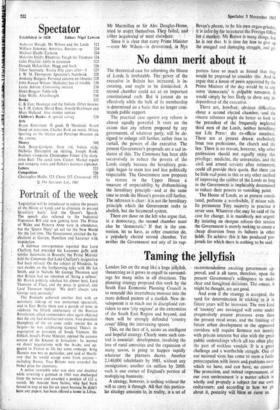No damn merit about it
- The theoretical case for reforming -the House of Lords is irrefutable. The power of -the executive in Britain has increased, is in- - creasing, and ought to be 'diminished. A second chamber could act a an important constitutional curb. But it aitriot, do so effectively while the bulk of its membership is.determined on a basis-that oo longer com- mands public support.
The practical case against -any reform is almost equally powerful. It rests on the axiom that any reform- proposed by any government, of whatever party; will be de- signed to enlarge still further, rather than to curtail, the powers of -the executive. The present Government's proposals are a sad in- stance of this. The Commons has been- able successively to reduce. the Powers -of the. Lords simply because -the hereditary_prin- elite. began- to seem less and less politically respectable. The Government now proposes to.. restore to the Upper Heine it measure of respectability-, hy ;disfranchising the hereditary principle—and: at the Same time to erode the House's powers still further. The inference is clear: it is not the hereditary principle which the Government seeks to abolish, but the bicameral system. . There are those on the left who argue that, in a democracy, the second chamber must also be 'democratic.' If that is the con- tention, let us have, as other countries do, a poPularly elected sec* chamber. Vet neither the Government nor: any of its sup- porters have so ,much as hinted that they would be prepared to consider this. And to argue that a house of peers appointed-by the Prime Minister of the day would be in any sense 'democratic' is Palpable 'nonsense. It would siMply be less likely to show any in- dependence of_the executive.- There are, however, obvious difficulties about a second elected chamber; and the sincere reformer might do better to look to the precedent of the frequently neglected third men of the Lords, neither hereditary nor Life Peers :, the ex-officio Members. These are at present drawn- exclusively from two professions, the church and the Jaw. There is no reason, however, why other professions should not equally, enjoy this privilege: medicine, the universities, and the civil and armed serviceS after retirement, could all provide their quota. But there can be little real point in this Or any other method bf improving the calibre of the Lords so long as the Government is iinphicably determined to reduce their powers to vanishing point.
The House of Lords, as at present consti- tuted, performs a.worthWhile, if Minor role. Its permanent Tory majority in practice it never uses. Whatever elsemay be said of the case for change, it is manifestly not -urgent. By insisting on shotgun reform this session the Government is merely seeking to create a cheap diversion from its failures in other fields. To achieve this. it .ha's produced pro- posals for which- there is-nothing to be said.










































 Previous page
Previous page